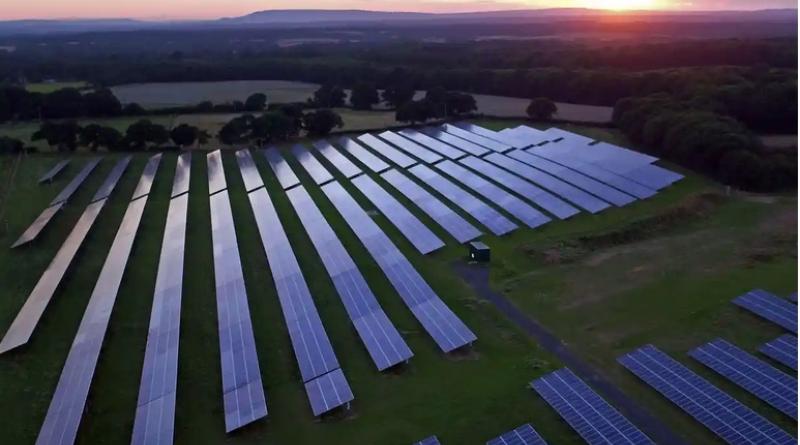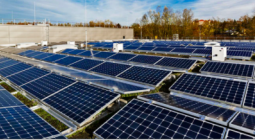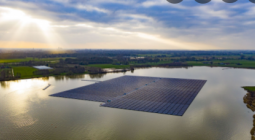Ministers hope to ban solar projects from most English farms

Exclusive: Environment minister seeks to expand definition of prime farmland in drive for productivity
Ministers are planning to ban solar farms from most of England’s farmland, the Guardian can reveal.
The new environment secretary, Ranil Jayawardena, is understood to oppose solar panels being placed on agricultural land, arguing that it impedes his programme of growth and boosting food production.
To this end, say government sources, he has asked his officials to redefine “best and most versatile” land (BMV), which is earmarked for farming, to include the middling-to-low category 3b. Land is graded from 1 to 5, and currently BMV includes grades 1 to 3a. Planning guidance says that development on BMV land should be avoided, although planning authorities may take other considerations into account.
Currently, most solar farms are built on and planned for 3b land, so this move would scupper most new developments of the renewable energy source.
Extending BMV to grade 3b would ban solar from about 41% of the land area of England, or about 58% of agricultural land. Much of grade 4 and 5 land is in upland areas that are unsuitable for solar developments.
During her speech at the Conservative party conference last week, the prime minister, Liz Truss, reeled off a list of “enemies”, including green campaigners, who make up what she characterised as the “anti-growth coalition”. However, green campaigners say blocking the building of renewables would make her government part of such a group.
Chris Hewett, chief executive of the trade association Solar Energy UK, said: “The UK solar sector is alarmed by attempts to put major planning rules in the way of cheap, homegrown energy. Solar power is the answer to so many needs and policy demands: it will cut energy bills, deliver energy security, boost growth and help rural economies. Ranil Jayawardena’s opposition to solar farms must surely make him part of the anti-growth coalition.”
To get this policy over the line, Defra would have to get signoff from the Department for Business, Energy and Industrial Strategy (BEIS) and the Department for Levelling Up, Housing and Communities.
It is understood that BEIS ministers are against the move, as they are trying to show that they are not only deregulating the oil and gas industry and fracking, but also renewable energy.
However, No 10 is understood to be sympathetic to the idea, with Truss having vowed to block solar farms on agricultural land during her election campaign.
Dustin Benton, policy director at the thinktank Green Alliance, said: “It would be odd to redefine ‘best and most versatile’ agricultural land to include soils that aren’t of high quality, just to block solar farms. It sounds like a tactic that the ‘anti-growth coalition’ might employ.
“The UK desperately needs to expand renewables so we don’t have to pay the extortionate cost of gas. Solar is one of the fastest energy sources to be deployed, so we should move quickly to build more in light of the gas crisis.”
Andy Mayer, chief operation officer at the Institute of Economic Affairs thinktank, said: “The government cannot on the one hand declare war on ‘the anti-growth coalition’, while on the other enforcing a right to veto developments, or waste time and money with excessive regulation.
“Farmers and green entrepreneurs are itching to provide solutions to the false claim that energy and food security cannot coexist. The City of London is ready to fund them. Long-term solutions to grid congestion and storage are possible. Market reform can provide a level-playing field for competition. Communities can benefit through more personal rewards from permitted development.
“That is what a supply-side revolution to encourage growth while supporting a transition to a cleaner greener future looks like. Not rigid rules, plans and targets that confuse, contradict and encourage opposition to change.”
Ed Miliband, shadow secretary for climate change and net zero, said: “If the government goes ahead with blocking solar energy, it will be yet more unilateral energy disarmament from a government that has a 12 year record of driving up bills by blocking clean power.
The blame for this plan lies squarely with the prime minister who has repeatedly opposed solar energy, the cheapest, cleanest, quickest form of power–and it will be the British people who pay the price in higher bills, higher gas imports and energy insecurity.”
The Department for Environment, Food and Rural Affairs refused to deny this change was on the cards, simply saying the government had been looking at options to support farming and economic growth while protecting nature and delivering on net zero.
cover photo: The move would scupper most new solar farm developments in England. Photograph: Steve Parsons/PA







